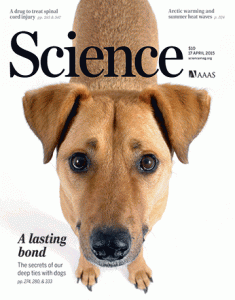The veterinarian Takefumi Kikusui with a research team from three Japanese universities (Azabu University, Jichi Medical University and University of Tokyo Health Sciences) recently published an article in Science about hormonal changes that dogs and their owners produce to each other.
Researchers put 30 dogs to interact with their owners for 30 minutes in a room and examined the urinary concentration of oxytocin -the love hormone- in both of them before and after the experiment. The results showed that gazing behavior between dogs and their owners increased the oxytocin production in their brains. Furthermore, they found that oxytocin administered to dogs increased eye contact with their owners, causing in owners an increase in the concentration of the oxytocin.
These findings support the existence of an interspecies oxytocin-mediated positive loop, facilitated and modulated by gazing, similar to what occurs between a human mother and her son. These results may have some important medical implications, since they support dogs-assisted therapies for certain diseases or disorders that are experimentally being treated with oxytocin.
Source
Nagasawa, M., Mitsui, S., En, S., Ohtani, N., Ohta, M., Sakuma, Y., Onaka, T., Mogi, K. & Kikusui, T. (2015). Oxytocin-gaze positive loop and the coevolution of human-dog bonds. Science, 348 (6232), 333-336. doi: 10.1126/science.1261022

